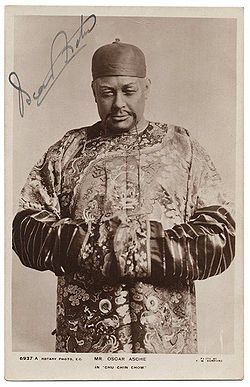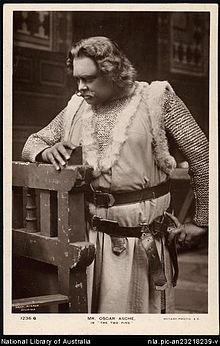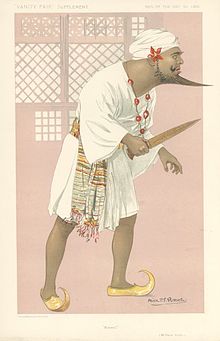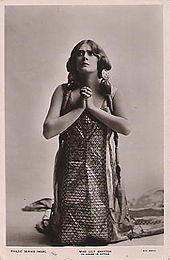- Oscar Asche
-
John Stange(r) Heiss Oscar Asche (26 January 1871 – 23 March 1936), better known as Oscar Asche, was an Australian actor, director and writer, best known for having written, directed, and acted in the record-breaking musical Chu Chin Chow, both on stage and film, and for acting in, directing, or producing many Shakespeare plays and successful musicals.[1]
Contents
Life and career
Asche was born in Geelong, Victoria, Australia. His father, Thomas, was born in Norway, was a law graduate at Christiania (now Oslo) University; he was a barrister but did not practise in Australia. After being a digger, a mounted police officer and a storekeeper, Thomas Asche became a prosperous hotel-keeper and publican in Melbourne and Sydney.[1]
Early life and training
Asche was educated at Laurel Lodge, Dandenong and the Melbourne Grammar School, which he left at 16. He then went on a holiday voyage to China, and after his return to Australia was articled to an architect who died soon afterwards. A few months later, he ran away and lived in the bush for some weeks and then obtained a position as a jackeroo. He returned to his parents and obtained a position in an office, but he had now decided to become an actor and made a beginning by getting up private theatricals at his home. He travelled to Fiji and on his return his father agreed to send him to Norway to study acting.
At Bergen, Norway, Asche was instructed in deportment, voice production and theatre arts. He found the Norwegian acting technique to be easy and natural. Two months later, he went to Christiania to study acting. There he met Ibsen, who advised him to go to his own country and work in his own language. Asche then went to London and was so impressed by Henry Irving and Ellen Terry in Henry VIII, that he saw the performance six times in succession. More study followed in London, where he had his Australian accent "corrected". He was fortunate in having an allowance of £10 a week from his father, but could not obtain work. In December 1892 he went to Norway again to give a Shakespeare recital, which was successful and brought him a little money.
Early stage career
On 25 March 1893 Asche made his first appearance on the stage, at the Opera Comique Theatre, London, as Roberts in Man and Woman. He then joined the F. R. Benson Company and for eight years gained experience an actor. Amongst other venues, they played at the summer Stratford festivals. He started with small parts and was eventually cast as Charles the Wrestler in As You Like It, being well-suited because of his excellent physique. He also played Biondello in The Taming of the Shrew, among other early roles. He was paid a salary of £2 10s. a week, but his father had been involved in the 1893 financial crisis and was unable to send him any allowance. At vacation times when he had no salary, Asche sometimes slept on the embankment and was glad to earn trifling tips for calling cabs. However, his salary was raised to £4 a week, and he was never in such straits again.
Asche played over a hundred roles with this company including Brutus, King Claudius and other important Shakespearian parts. His resonant voice and his dignified, formal bearing are often mentioned in the reviews of his performances. Asche was a good athlete and a fair cricketer and played for the Marylebone Cricket Club against Minor counties of English cricket. He was a constant attendant at important matches at Lord's Cricket Ground.
Asche married Lily Brayton, another member of the company, in 1898, and the two were often cast in the same productions for many years. In 1900 Asche appeared with the Benson Company at the Lyceum Theatre in London, where his performance as Pistol in Henry V, and his Claudius in Hamlet were both praised. He had another success at the Garrick Theatre in 1901 when he played Maldonado in Arthur Wing Pinero's Iris, his first important part in modern comedy. He also travelled to America to repeat the role on Broadway in 1902. Back in London, he joined Sir Herbert Beerbohm Tree's theatre company in 1902, and in 1903 he played Benedick in Much Ado About Nothing opposite the Beatrice of Ellen Terry. Other parts were Bolingbroke in Richard II, Christopher Sly and Petruchio in The Taming of the Shrew, Bottom in A Midsummer Night's Dream, and Angelo in Measure for Measure.
Actor-Manager years
In 1904, Asche and his wife became managers of the Adelphi Theatre. The productions they mounted included The Prayer of the Sword, A Midsummer Night’s Dream, The Taming of the Shrew, Measure for Measure, Count Hannibal (which he wrote with F. Norreys Connell), and Rudolph Besier's The Virgin Goddess. In 1906 he played King Mark in Joseph Comyns Carr's play Tristram and Iseult at the Adelphi Theatre, with Lily Brayton as Iseult and Matheson Lang as Tristram.
In 1907 Asche and his wife took over the management of His Majesty's Theatre and produced Laurence Binyon’s Attila, with Asche in the title role, and innovative productions of Shakespeare plays, such as As You Like It, with Asche as Jacques, and Othello, with Asche in the title role. They made their first tour in Australia in 1909–10, with Asche playing Petruchio, Othello and other roles. Asche was much touched by his reception at Melbourne. In his 1929 autobiography he said, "What a home-coming it was! Nothing, nothing can ever deprive me of that. I had made good and had come home to show them. Whatever the future years held, or shall hold for me nothing can eliminate that."
On his return to London in 1911, Edward Knoblock wrote Kismet for Asche (later made into the 1953 musical), with the understanding that he could revise it. He shortened and partly re-wrote it and produced it with much success, playing Hajj.[2] The production ran for two years, and a successful tour in Australia followed in 1911–12, with Kismet, A Midsummer Night's Dream, and Antony and Cleopatra. Back in London, Kismet was revived successfully, but in October 1914 Asche's own play Mameena based on Rider Haggard's novel, A Child of the Storm, though at first well received, proved a financial failure, largely on account of the conditions in London at the beginning of World War I.
In 1916, Asche produced his play Chu Chin Chow, music by Frederic Norton, starring himself and his wife, which ran from 31 August 1916 to 22 July 1921, a world's record that stood for decades. The show drew some criticism for the ladies' scanty costumes, which Herbert Beerbohm Tree described as "more navel than millinery", but it was just what war-weary audiences wanted.[3] Asche played the part of Abu Hasan and confessed that "it got terribly boring going down those stairs night after night to go through the same old lines". But Asche was a perfectionist, and the performance was never allowed to get slack. Chu Chin Chow also played in New York City in 1917 and Australia in 1920. Asche also collaborated in 1919 with Dornford Yates on a musical adaptation of Eastward Ho![4]
Asche established a great reputation as a producer, and during the run of Chu Chin Chow, he directed the hit London production of The Maid of the Mountains for Robert Evett and the George Edwardes Estate, which also had a record run for a play of its kind. As a director, Asche was an important influence in his time. He was an innovator in stage lighting and one of the first to use it as a dramatic factor in productions rather than as mere illumination. He was known for his use of colour, and for his sensitivity about the dividing line between opulence and vulgarity. He brought unprecedented numbers of spectators to the theatre at its most difficult time during World War I, and he has been credited for extending the popularity of the theatre in competition with cinema.
Later years
Though Asche had been making a large income for many years he also spent largely. He was much interested in coursing, kept many greyhounds, and lost tens of thousands of pounds gambling on them. He bought a farm in Gloucestershire that was a constant expense, and he eventually had to sell it to pay his debts.
After the success of Chu Chin Chow, Asche wrote another musical that opened on Broadway in 1920 under the name Mecca and then in London the following year under the name Cairo. It was not a big success on either side of the Atlantic. In 1922, Asche visited Australia again, under contract to J. C. Williamson Ltd., and made successful appearances as Hornblower in Galsworthy's The Shin Game, Maldonado in Pinero's Iris, his usual roles in Chu Chin Chow and Cairo, the title character in Julius Caesar, and in other Shakespeare plays. His wife declined to join him on this tour. After disagreements with Williamson, his contract was abruptly terminated in June 1924. On his return to Britain, as a result of excessive gambling, tax debts and unwise investments, he was declared bankrupt.
Further successes eluded Asche as he tried to mount musicals, including The Good Old Days of England (1928), financed by his wife. He continued to direct shows. In 1933, he made his last stage appearance in The Beggar’s Bowl at the Duke of York’s Theatre. Asche also made appearances in seven films between 1932 and 1936, including in Two Hearts in Waltz Time (1934), as the Spirit of Christmas Present in the 1935 film Scrooge, with Seymour Hicks, and in The Private Secretary (1935). He also wrote several books, including his autobiography, but these ventures did not solve his financial troubles.
In his final years, Asche became grossly obese, desperately poor, argumentative and violent. He was childless but had a nephew, Keith John Austin Asche, AC, who became Chief Justice of the Northern Territory and its Administrator from 1993 to 1997. Asche and his wife separated, but, at the end, he returned to her and died at the age of 65 in Bisham, Berkshire, of coronary thrombosis. He was buried in the riverside cemetery there.
Writings
Asche's autobiography, Oscar Asche: His Life (1929), must be read with caution whenever figures are mentioned. He also wrote two novels: the Saga of Hans Hansen (1930), an improbable but exciting story, and The Joss Sticks of Chung (1931). His play Chu Chin Chow was published in 1931, but the other plays of which he was author or part author have not been printed. Among these were Mameena (1914), Cairo (1921), The Good Old Days, and The Spanish Main (under the name of Varco Marenes).
Notes
- ^ a b Information about Asche
- ^ Kismet in The Play Pictorial Vol. XVIII, No. 106 (1911), accessed at the Stagebeauty website on 22 December 2009
- ^ "Oscar Asche (1871–1936) at the Live Performance Australia Hall of Fame
- ^ A review of Eastward Ho! was published in The Times, 10 September 1919, p. 8
References
- Singleton, Brian. Oscar Asche, Orientalism, and British Musical Comedy (2004) ISBN 0-275-97929-6
- L. J. Blake, "Asche, Thomas Stange Heiss Oscar (1871–1936)", Australian Dictionary of Biography, Volume 7, MUP, 1979, pp 105–06.
- H. Pearson, The Last Actor-Managers (Lond, 1950)
- W. R. Brownhill, The History of Geelong and Corio Bay (Melbourne, 1955)
- M. L. Kiddle, Men of Yesterday (Melbourne, 1961)
- H. Porter, Stars of Australian Stage and Screen (Adelaide, 1965)
- P. Hartnoll (ed), The Concise Oxford Companion to the Theatre (Oxford, 1972)
- Harold Love (ed), Australian stage : a documentary history, Kensington, N.S.W.: New South Wales University Press, 1984.
- Companion to Theatre in Australia, Sydney: Currency Press in association with Cambridge University Press, 1995.
- L. G. Wickham Legg (ed), Dictionary of National Biography, 1931–1940 [Oxford]: London: (Oxford : Oxford University Press ; Geoffrey Cumberledge, Charles Batey), 1949.
- Ann Atkinson [et al.] (ed), Dictionary of Performing Arts in Australia, v.1, Theatre, film, radio, television / St. Leonards, N.S.W.: Allen & Unwin, 1996.
- Kurt Ganzl, Encyclopedia of Musical Theatre, v.1 Oxford: Blackwell Reference, 1994.
- Who was who in the Theatre, 1912–1976: a biographical dictionary of actors, actresses, directors, playwrights, and producers of the English-speaking theatre v. 1 Detroit: Gale Research Co., 1978.
- Serle, Percival (1949). "Asche, Oscar". Dictionary of Australian Biography. Sydney: Angus and Robertson. http://gutenberg.net.au/dictbiog/0-dict-biogA.html#asche1.
- Fletcher, Chrissy, A Theatrical Life: The Many Faces of Oscar Asche 1871–1936 (2002, Fletcher) ISBN 0-9580497-1-8.
External links
- Biography, bibliography, Australian tour information and resource listing for Oscar Asche in the National Library of Australia
- Picture Australia records of images of Oscar Asche
- collectorspost.com
- Oscar Asche's profile at the Emory University Shakespeare Project
- Oscar Asche at the Internet Movie Database
- Oscar Asche at the Internet Broadway Database
- Oscar Asche at the Live Performance Australia Hall of Fame
- Eastward Ho!
- List of some of Asche's performances in Australia (AusStage)
Categories:- 1936 deaths
- People educated at Melbourne Grammar School
- 1871 births
- Australian film actors
- Australian film directors
- Australian dramatists and playwrights
- Australian novelists
- Actor-managers
Wikimedia Foundation. 2010.




